Commercial Law: Agency, Principal-Agent Relationship, and Duties
VerifiedAdded on 2020/12/18
|10
|3399
|242
Report
AI Summary
This report provides a detailed analysis of agency within the context of commercial law. It begins with an introduction to commercial law, defining its scope and relevance. The main body of the report explores the formation of agency through express and implied agreements, including agency by estoppel, holding out, necessity, and ratification. It examines the authority and scope of an agent's actions, the rights and duties of both agents and principals, and the termination of agency through various methods, such as agreement, the act of parties, and operation of law. Key legal cases, including Ireland v. Livingston and Henderson v. Merrett Syndicates Ltd., are discussed to illustrate the practical application of agency principles. The report also outlines the different types of agents (special, general, and universal) and the rights of agents, such as the right to remuneration, lien, reimbursement for expenses, and compensation. Finally, it covers the rights of the principal, including the right to ratify or disown the agent's actions, revoke the agent's authority, and claim profit and loss. Overall, the report offers a comprehensive overview of the legal framework governing agency relationships in commercial transactions.
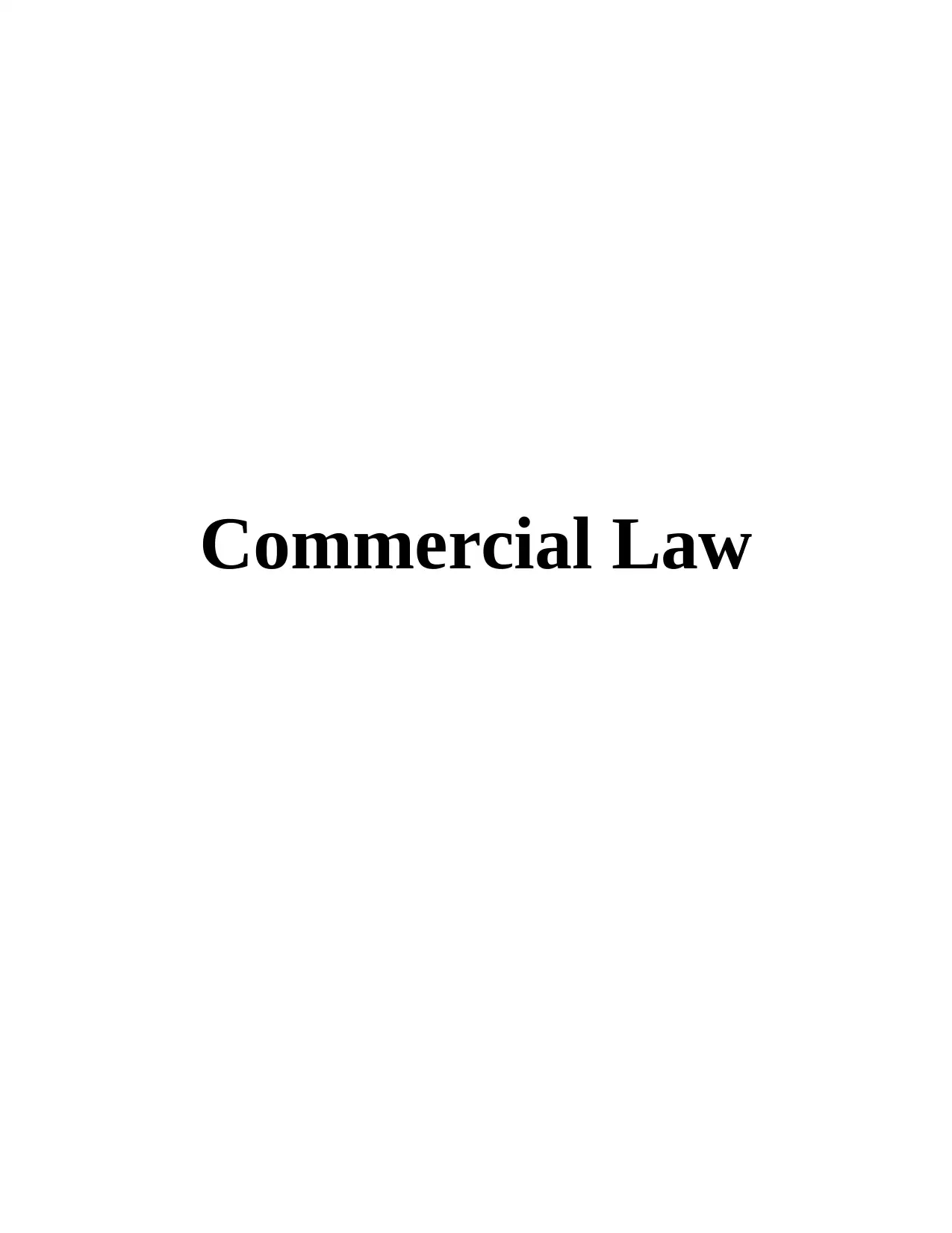
Commercial Law
Paraphrase This Document
Need a fresh take? Get an instant paraphrase of this document with our AI Paraphraser

Table of Contents
INTRODUCTION...........................................................................................................................3
MAIN BODY...................................................................................................................................3
CONCLUSION................................................................................................................................9
REFERENCES..............................................................................................................................10
.......................................................................................................................................................10
INTRODUCTION...........................................................................................................................3
MAIN BODY...................................................................................................................................3
CONCLUSION................................................................................................................................9
REFERENCES..............................................................................................................................10
.......................................................................................................................................................10
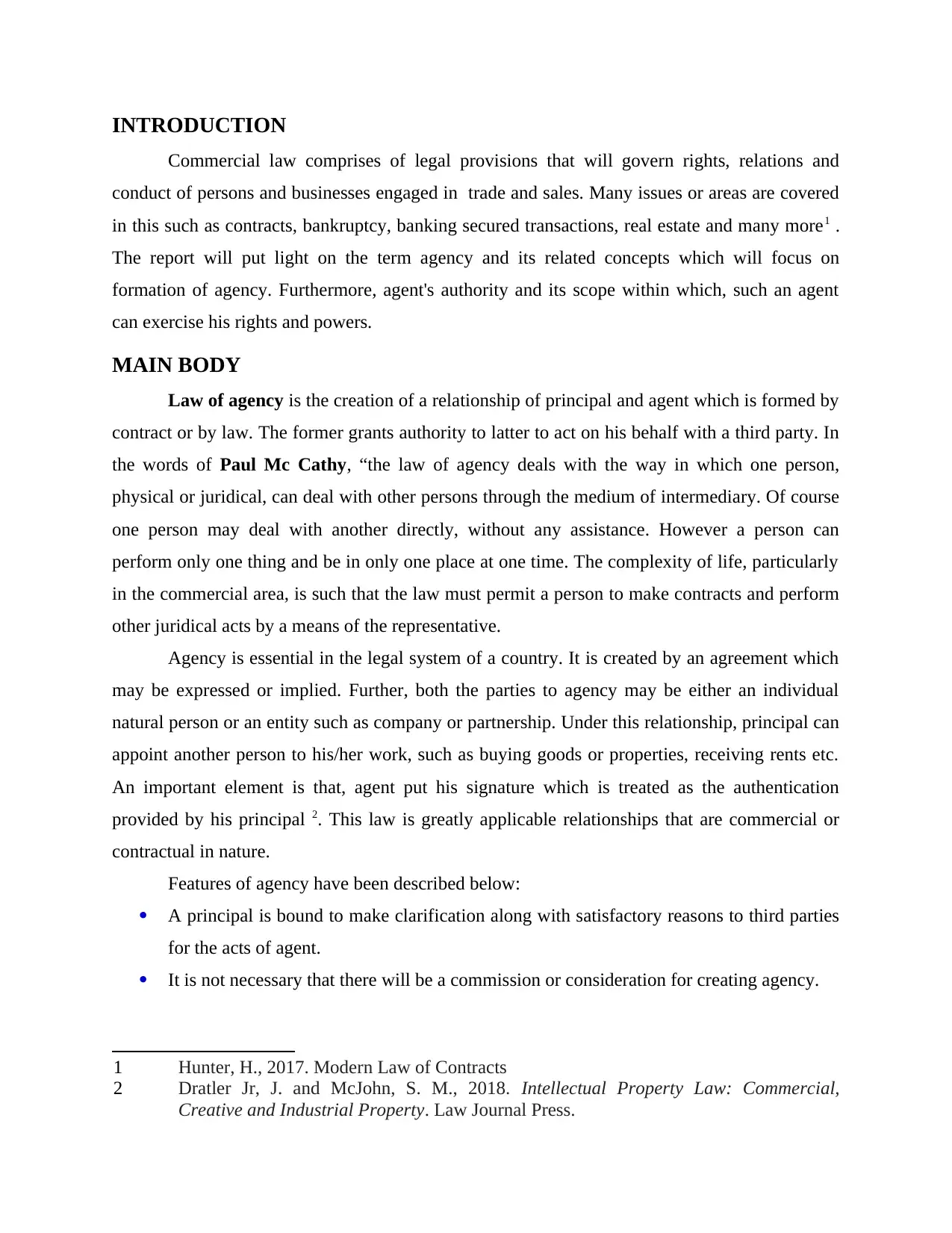
INTRODUCTION
Commercial law comprises of legal provisions that will govern rights, relations and
conduct of persons and businesses engaged in trade and sales. Many issues or areas are covered
in this such as contracts, bankruptcy, banking secured transactions, real estate and many more1 .
The report will put light on the term agency and its related concepts which will focus on
formation of agency. Furthermore, agent's authority and its scope within which, such an agent
can exercise his rights and powers.
MAIN BODY
Law of agency is the creation of a relationship of principal and agent which is formed by
contract or by law. The former grants authority to latter to act on his behalf with a third party. In
the words of Paul Mc Cathy, “the law of agency deals with the way in which one person,
physical or juridical, can deal with other persons through the medium of intermediary. Of course
one person may deal with another directly, without any assistance. However a person can
perform only one thing and be in only one place at one time. The complexity of life, particularly
in the commercial area, is such that the law must permit a person to make contracts and perform
other juridical acts by a means of the representative.
Agency is essential in the legal system of a country. It is created by an agreement which
may be expressed or implied. Further, both the parties to agency may be either an individual
natural person or an entity such as company or partnership. Under this relationship, principal can
appoint another person to his/her work, such as buying goods or properties, receiving rents etc.
An important element is that, agent put his signature which is treated as the authentication
provided by his principal 2. This law is greatly applicable relationships that are commercial or
contractual in nature.
Features of agency have been described below:
A principal is bound to make clarification along with satisfactory reasons to third parties
for the acts of agent.
It is not necessary that there will be a commission or consideration for creating agency.
1 Hunter, H., 2017. Modern Law of Contracts
2 Dratler Jr, J. and McJohn, S. M., 2018. Intellectual Property Law: Commercial,
Creative and Industrial Property. Law Journal Press.
Commercial law comprises of legal provisions that will govern rights, relations and
conduct of persons and businesses engaged in trade and sales. Many issues or areas are covered
in this such as contracts, bankruptcy, banking secured transactions, real estate and many more1 .
The report will put light on the term agency and its related concepts which will focus on
formation of agency. Furthermore, agent's authority and its scope within which, such an agent
can exercise his rights and powers.
MAIN BODY
Law of agency is the creation of a relationship of principal and agent which is formed by
contract or by law. The former grants authority to latter to act on his behalf with a third party. In
the words of Paul Mc Cathy, “the law of agency deals with the way in which one person,
physical or juridical, can deal with other persons through the medium of intermediary. Of course
one person may deal with another directly, without any assistance. However a person can
perform only one thing and be in only one place at one time. The complexity of life, particularly
in the commercial area, is such that the law must permit a person to make contracts and perform
other juridical acts by a means of the representative.
Agency is essential in the legal system of a country. It is created by an agreement which
may be expressed or implied. Further, both the parties to agency may be either an individual
natural person or an entity such as company or partnership. Under this relationship, principal can
appoint another person to his/her work, such as buying goods or properties, receiving rents etc.
An important element is that, agent put his signature which is treated as the authentication
provided by his principal 2. This law is greatly applicable relationships that are commercial or
contractual in nature.
Features of agency have been described below:
A principal is bound to make clarification along with satisfactory reasons to third parties
for the acts of agent.
It is not necessary that there will be a commission or consideration for creating agency.
1 Hunter, H., 2017. Modern Law of Contracts
2 Dratler Jr, J. and McJohn, S. M., 2018. Intellectual Property Law: Commercial,
Creative and Industrial Property. Law Journal Press.
⊘ This is a preview!⊘
Do you want full access?
Subscribe today to unlock all pages.

Trusted by 1+ million students worldwide
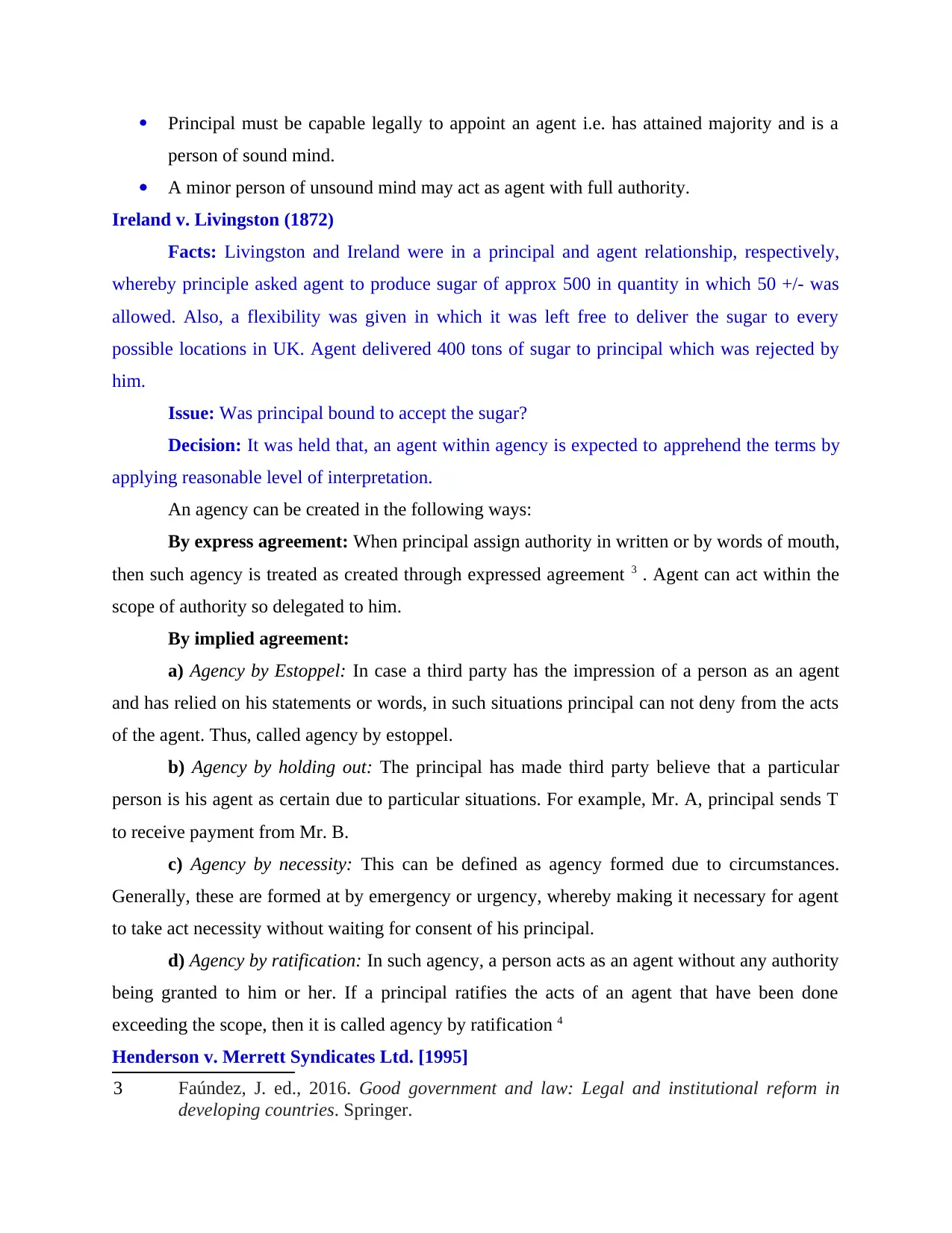
Principal must be capable legally to appoint an agent i.e. has attained majority and is a
person of sound mind.
A minor person of unsound mind may act as agent with full authority.
Ireland v. Livingston (1872)
Facts: Livingston and Ireland were in a principal and agent relationship, respectively,
whereby principle asked agent to produce sugar of approx 500 in quantity in which 50 +/- was
allowed. Also, a flexibility was given in which it was left free to deliver the sugar to every
possible locations in UK. Agent delivered 400 tons of sugar to principal which was rejected by
him.
Issue: Was principal bound to accept the sugar?
Decision: It was held that, an agent within agency is expected to apprehend the terms by
applying reasonable level of interpretation.
An agency can be created in the following ways:
By express agreement: When principal assign authority in written or by words of mouth,
then such agency is treated as created through expressed agreement 3 . Agent can act within the
scope of authority so delegated to him.
By implied agreement:
a) Agency by Estoppel: In case a third party has the impression of a person as an agent
and has relied on his statements or words, in such situations principal can not deny from the acts
of the agent. Thus, called agency by estoppel.
b) Agency by holding out: The principal has made third party believe that a particular
person is his agent as certain due to particular situations. For example, Mr. A, principal sends T
to receive payment from Mr. B.
c) Agency by necessity: This can be defined as agency formed due to circumstances.
Generally, these are formed at by emergency or urgency, whereby making it necessary for agent
to take act necessity without waiting for consent of his principal.
d) Agency by ratification: In such agency, a person acts as an agent without any authority
being granted to him or her. If a principal ratifies the acts of an agent that have been done
exceeding the scope, then it is called agency by ratification 4
Henderson v. Merrett Syndicates Ltd. [1995]
3 Faúndez, J. ed., 2016. Good government and law: Legal and institutional reform in
developing countries. Springer.
person of sound mind.
A minor person of unsound mind may act as agent with full authority.
Ireland v. Livingston (1872)
Facts: Livingston and Ireland were in a principal and agent relationship, respectively,
whereby principle asked agent to produce sugar of approx 500 in quantity in which 50 +/- was
allowed. Also, a flexibility was given in which it was left free to deliver the sugar to every
possible locations in UK. Agent delivered 400 tons of sugar to principal which was rejected by
him.
Issue: Was principal bound to accept the sugar?
Decision: It was held that, an agent within agency is expected to apprehend the terms by
applying reasonable level of interpretation.
An agency can be created in the following ways:
By express agreement: When principal assign authority in written or by words of mouth,
then such agency is treated as created through expressed agreement 3 . Agent can act within the
scope of authority so delegated to him.
By implied agreement:
a) Agency by Estoppel: In case a third party has the impression of a person as an agent
and has relied on his statements or words, in such situations principal can not deny from the acts
of the agent. Thus, called agency by estoppel.
b) Agency by holding out: The principal has made third party believe that a particular
person is his agent as certain due to particular situations. For example, Mr. A, principal sends T
to receive payment from Mr. B.
c) Agency by necessity: This can be defined as agency formed due to circumstances.
Generally, these are formed at by emergency or urgency, whereby making it necessary for agent
to take act necessity without waiting for consent of his principal.
d) Agency by ratification: In such agency, a person acts as an agent without any authority
being granted to him or her. If a principal ratifies the acts of an agent that have been done
exceeding the scope, then it is called agency by ratification 4
Henderson v. Merrett Syndicates Ltd. [1995]
3 Faúndez, J. ed., 2016. Good government and law: Legal and institutional reform in
developing countries. Springer.
Paraphrase This Document
Need a fresh take? Get an instant paraphrase of this document with our AI Paraphraser
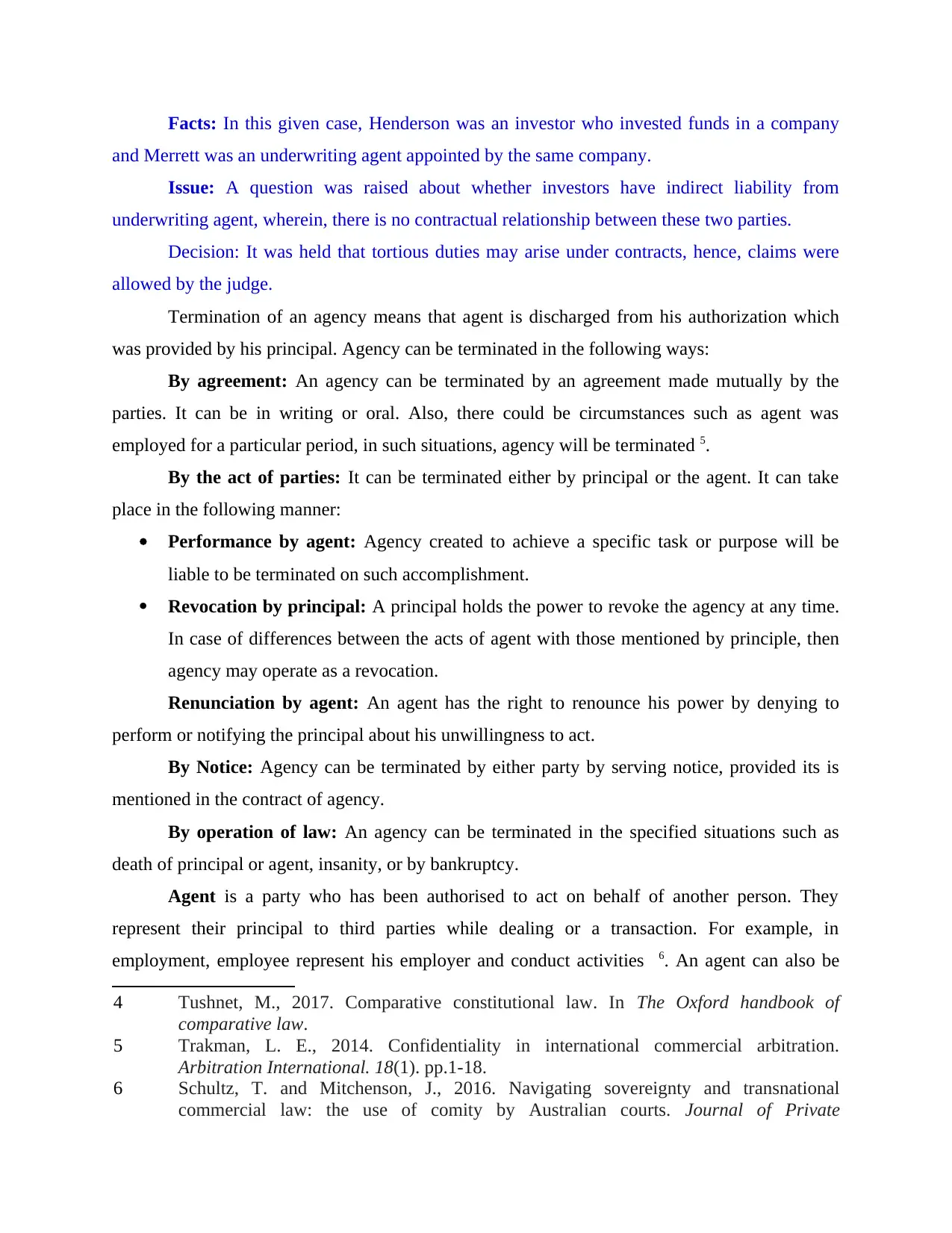
Facts: In this given case, Henderson was an investor who invested funds in a company
and Merrett was an underwriting agent appointed by the same company.
Issue: A question was raised about whether investors have indirect liability from
underwriting agent, wherein, there is no contractual relationship between these two parties.
Decision: It was held that tortious duties may arise under contracts, hence, claims were
allowed by the judge.
Termination of an agency means that agent is discharged from his authorization which
was provided by his principal. Agency can be terminated in the following ways:
By agreement: An agency can be terminated by an agreement made mutually by the
parties. It can be in writing or oral. Also, there could be circumstances such as agent was
employed for a particular period, in such situations, agency will be terminated 5.
By the act of parties: It can be terminated either by principal or the agent. It can take
place in the following manner:
Performance by agent: Agency created to achieve a specific task or purpose will be
liable to be terminated on such accomplishment.
Revocation by principal: A principal holds the power to revoke the agency at any time.
In case of differences between the acts of agent with those mentioned by principle, then
agency may operate as a revocation.
Renunciation by agent: An agent has the right to renounce his power by denying to
perform or notifying the principal about his unwillingness to act.
By Notice: Agency can be terminated by either party by serving notice, provided its is
mentioned in the contract of agency.
By operation of law: An agency can be terminated in the specified situations such as
death of principal or agent, insanity, or by bankruptcy.
Agent is a party who has been authorised to act on behalf of another person. They
represent their principal to third parties while dealing or a transaction. For example, in
employment, employee represent his employer and conduct activities 6. An agent can also be
4 Tushnet, M., 2017. Comparative constitutional law. In The Oxford handbook of
comparative law.
5 Trakman, L. E., 2014. Confidentiality in international commercial arbitration.
Arbitration International. 18(1). pp.1-18.
6 Schultz, T. and Mitchenson, J., 2016. Navigating sovereignty and transnational
commercial law: the use of comity by Australian courts. Journal of Private
and Merrett was an underwriting agent appointed by the same company.
Issue: A question was raised about whether investors have indirect liability from
underwriting agent, wherein, there is no contractual relationship between these two parties.
Decision: It was held that tortious duties may arise under contracts, hence, claims were
allowed by the judge.
Termination of an agency means that agent is discharged from his authorization which
was provided by his principal. Agency can be terminated in the following ways:
By agreement: An agency can be terminated by an agreement made mutually by the
parties. It can be in writing or oral. Also, there could be circumstances such as agent was
employed for a particular period, in such situations, agency will be terminated 5.
By the act of parties: It can be terminated either by principal or the agent. It can take
place in the following manner:
Performance by agent: Agency created to achieve a specific task or purpose will be
liable to be terminated on such accomplishment.
Revocation by principal: A principal holds the power to revoke the agency at any time.
In case of differences between the acts of agent with those mentioned by principle, then
agency may operate as a revocation.
Renunciation by agent: An agent has the right to renounce his power by denying to
perform or notifying the principal about his unwillingness to act.
By Notice: Agency can be terminated by either party by serving notice, provided its is
mentioned in the contract of agency.
By operation of law: An agency can be terminated in the specified situations such as
death of principal or agent, insanity, or by bankruptcy.
Agent is a party who has been authorised to act on behalf of another person. They
represent their principal to third parties while dealing or a transaction. For example, in
employment, employee represent his employer and conduct activities 6. An agent can also be
4 Tushnet, M., 2017. Comparative constitutional law. In The Oxford handbook of
comparative law.
5 Trakman, L. E., 2014. Confidentiality in international commercial arbitration.
Arbitration International. 18(1). pp.1-18.
6 Schultz, T. and Mitchenson, J., 2016. Navigating sovereignty and transnational
commercial law: the use of comity by Australian courts. Journal of Private
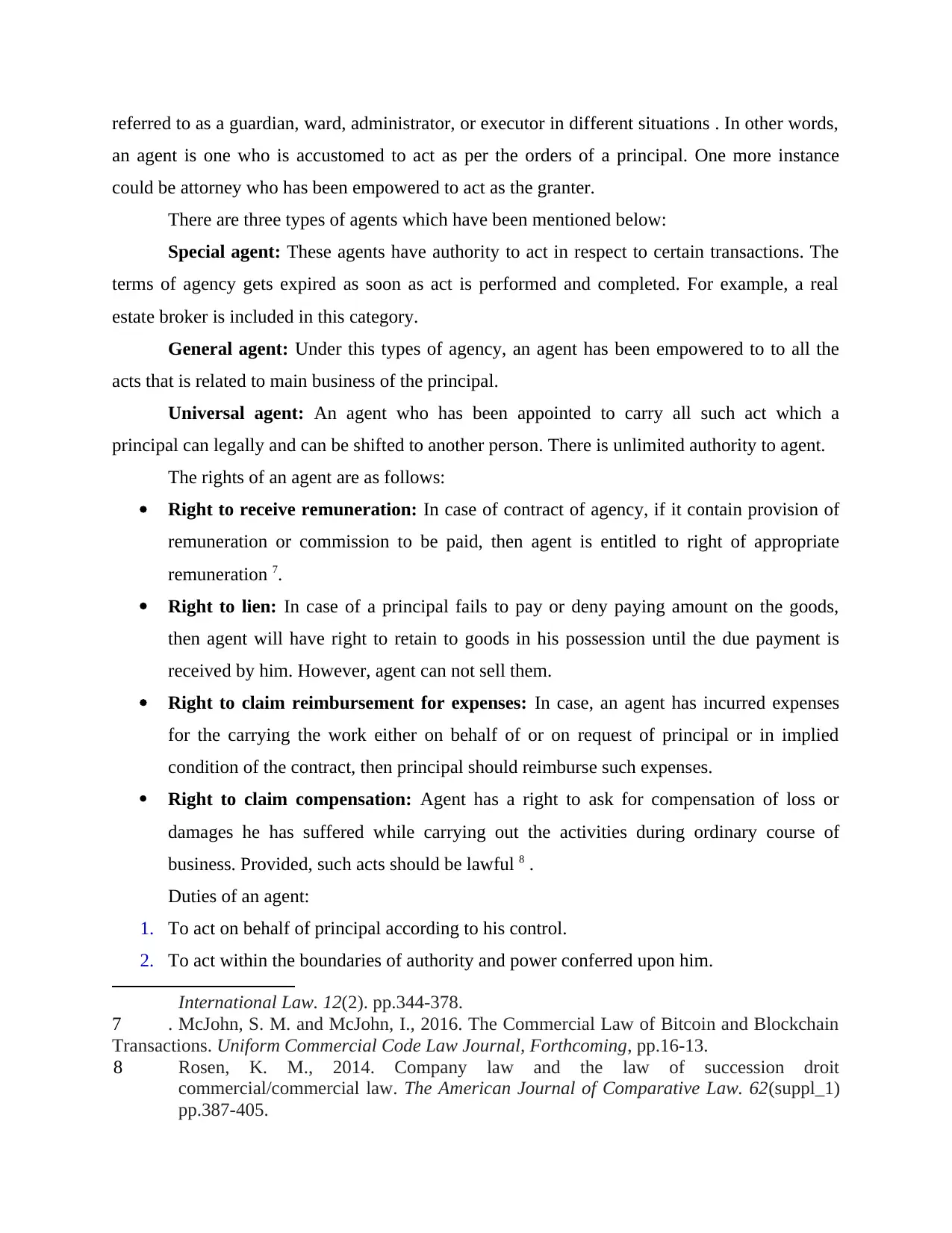
referred to as a guardian, ward, administrator, or executor in different situations . In other words,
an agent is one who is accustomed to act as per the orders of a principal. One more instance
could be attorney who has been empowered to act as the granter.
There are three types of agents which have been mentioned below:
Special agent: These agents have authority to act in respect to certain transactions. The
terms of agency gets expired as soon as act is performed and completed. For example, a real
estate broker is included in this category.
General agent: Under this types of agency, an agent has been empowered to to all the
acts that is related to main business of the principal.
Universal agent: An agent who has been appointed to carry all such act which a
principal can legally and can be shifted to another person. There is unlimited authority to agent.
The rights of an agent are as follows:
Right to receive remuneration: In case of contract of agency, if it contain provision of
remuneration or commission to be paid, then agent is entitled to right of appropriate
remuneration 7.
Right to lien: In case of a principal fails to pay or deny paying amount on the goods,
then agent will have right to retain to goods in his possession until the due payment is
received by him. However, agent can not sell them.
Right to claim reimbursement for expenses: In case, an agent has incurred expenses
for the carrying the work either on behalf of or on request of principal or in implied
condition of the contract, then principal should reimburse such expenses.
Right to claim compensation: Agent has a right to ask for compensation of loss or
damages he has suffered while carrying out the activities during ordinary course of
business. Provided, such acts should be lawful 8 .
Duties of an agent:
1. To act on behalf of principal according to his control.
2. To act within the boundaries of authority and power conferred upon him.
International Law. 12(2). pp.344-378.
7 . McJohn, S. M. and McJohn, I., 2016. The Commercial Law of Bitcoin and Blockchain
Transactions. Uniform Commercial Code Law Journal, Forthcoming, pp.16-13.
8 Rosen, K. M., 2014. Company law and the law of succession droit
commercial/commercial law. The American Journal of Comparative Law. 62(suppl_1)
pp.387-405.
an agent is one who is accustomed to act as per the orders of a principal. One more instance
could be attorney who has been empowered to act as the granter.
There are three types of agents which have been mentioned below:
Special agent: These agents have authority to act in respect to certain transactions. The
terms of agency gets expired as soon as act is performed and completed. For example, a real
estate broker is included in this category.
General agent: Under this types of agency, an agent has been empowered to to all the
acts that is related to main business of the principal.
Universal agent: An agent who has been appointed to carry all such act which a
principal can legally and can be shifted to another person. There is unlimited authority to agent.
The rights of an agent are as follows:
Right to receive remuneration: In case of contract of agency, if it contain provision of
remuneration or commission to be paid, then agent is entitled to right of appropriate
remuneration 7.
Right to lien: In case of a principal fails to pay or deny paying amount on the goods,
then agent will have right to retain to goods in his possession until the due payment is
received by him. However, agent can not sell them.
Right to claim reimbursement for expenses: In case, an agent has incurred expenses
for the carrying the work either on behalf of or on request of principal or in implied
condition of the contract, then principal should reimburse such expenses.
Right to claim compensation: Agent has a right to ask for compensation of loss or
damages he has suffered while carrying out the activities during ordinary course of
business. Provided, such acts should be lawful 8 .
Duties of an agent:
1. To act on behalf of principal according to his control.
2. To act within the boundaries of authority and power conferred upon him.
International Law. 12(2). pp.344-378.
7 . McJohn, S. M. and McJohn, I., 2016. The Commercial Law of Bitcoin and Blockchain
Transactions. Uniform Commercial Code Law Journal, Forthcoming, pp.16-13.
8 Rosen, K. M., 2014. Company law and the law of succession droit
commercial/commercial law. The American Journal of Comparative Law. 62(suppl_1)
pp.387-405.
⊘ This is a preview!⊘
Do you want full access?
Subscribe today to unlock all pages.

Trusted by 1+ million students worldwide
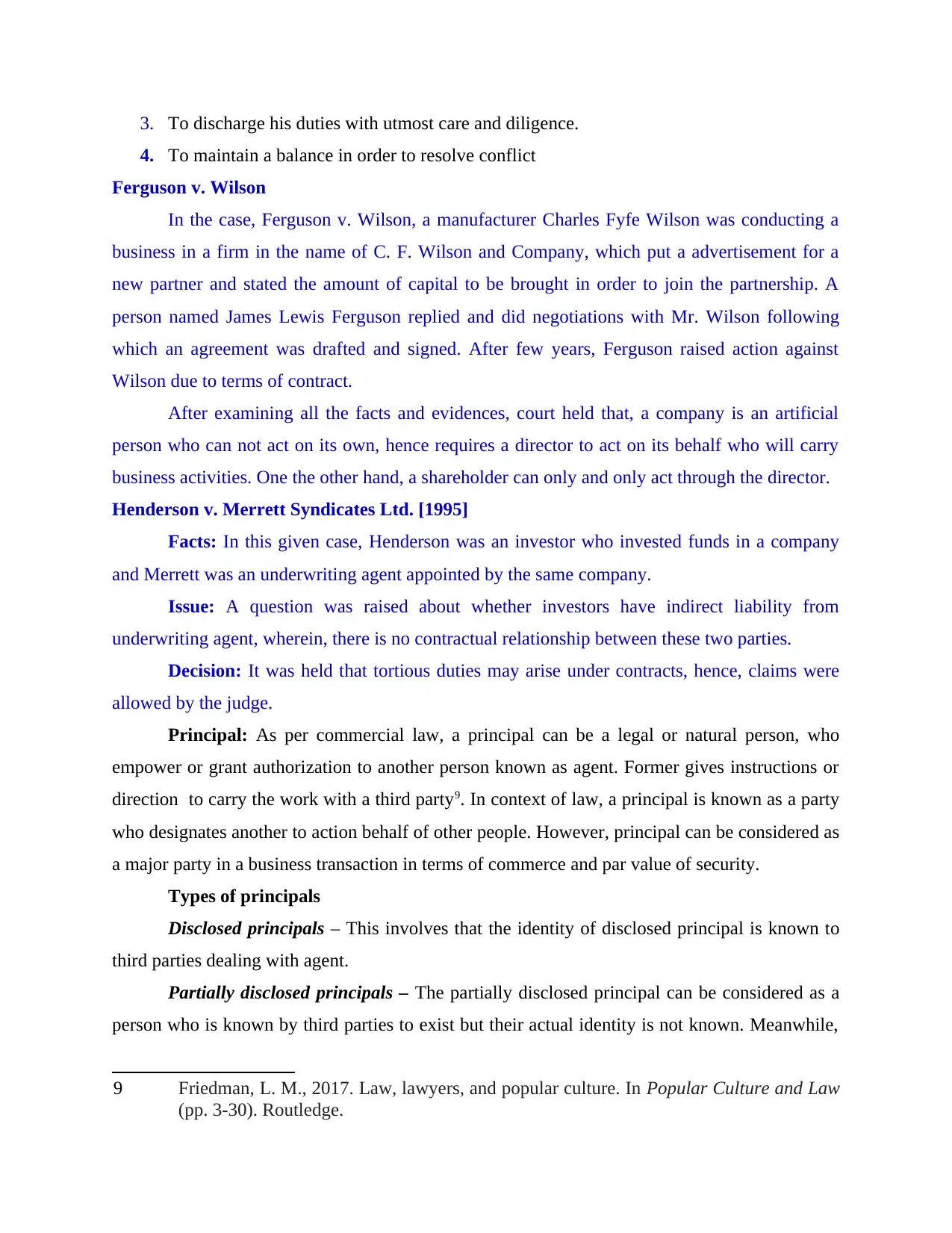
3. To discharge his duties with utmost care and diligence.
4. To maintain a balance in order to resolve conflict
Ferguson v. Wilson
In the case, Ferguson v. Wilson, a manufacturer Charles Fyfe Wilson was conducting a
business in a firm in the name of C. F. Wilson and Company, which put a advertisement for a
new partner and stated the amount of capital to be brought in order to join the partnership. A
person named James Lewis Ferguson replied and did negotiations with Mr. Wilson following
which an agreement was drafted and signed. After few years, Ferguson raised action against
Wilson due to terms of contract.
After examining all the facts and evidences, court held that, a company is an artificial
person who can not act on its own, hence requires a director to act on its behalf who will carry
business activities. One the other hand, a shareholder can only and only act through the director.
Henderson v. Merrett Syndicates Ltd. [1995]
Facts: In this given case, Henderson was an investor who invested funds in a company
and Merrett was an underwriting agent appointed by the same company.
Issue: A question was raised about whether investors have indirect liability from
underwriting agent, wherein, there is no contractual relationship between these two parties.
Decision: It was held that tortious duties may arise under contracts, hence, claims were
allowed by the judge.
Principal: As per commercial law, a principal can be a legal or natural person, who
empower or grant authorization to another person known as agent. Former gives instructions or
direction to carry the work with a third party9. In context of law, a principal is known as a party
who designates another to action behalf of other people. However, principal can be considered as
a major party in a business transaction in terms of commerce and par value of security.
Types of principals
Disclosed principals – This involves that the identity of disclosed principal is known to
third parties dealing with agent.
Partially disclosed principals – The partially disclosed principal can be considered as a
person who is known by third parties to exist but their actual identity is not known. Meanwhile,
9 Friedman, L. M., 2017. Law, lawyers, and popular culture. In Popular Culture and Law
(pp. 3-30). Routledge.
4. To maintain a balance in order to resolve conflict
Ferguson v. Wilson
In the case, Ferguson v. Wilson, a manufacturer Charles Fyfe Wilson was conducting a
business in a firm in the name of C. F. Wilson and Company, which put a advertisement for a
new partner and stated the amount of capital to be brought in order to join the partnership. A
person named James Lewis Ferguson replied and did negotiations with Mr. Wilson following
which an agreement was drafted and signed. After few years, Ferguson raised action against
Wilson due to terms of contract.
After examining all the facts and evidences, court held that, a company is an artificial
person who can not act on its own, hence requires a director to act on its behalf who will carry
business activities. One the other hand, a shareholder can only and only act through the director.
Henderson v. Merrett Syndicates Ltd. [1995]
Facts: In this given case, Henderson was an investor who invested funds in a company
and Merrett was an underwriting agent appointed by the same company.
Issue: A question was raised about whether investors have indirect liability from
underwriting agent, wherein, there is no contractual relationship between these two parties.
Decision: It was held that tortious duties may arise under contracts, hence, claims were
allowed by the judge.
Principal: As per commercial law, a principal can be a legal or natural person, who
empower or grant authorization to another person known as agent. Former gives instructions or
direction to carry the work with a third party9. In context of law, a principal is known as a party
who designates another to action behalf of other people. However, principal can be considered as
a major party in a business transaction in terms of commerce and par value of security.
Types of principals
Disclosed principals – This involves that the identity of disclosed principal is known to
third parties dealing with agent.
Partially disclosed principals – The partially disclosed principal can be considered as a
person who is known by third parties to exist but their actual identity is not known. Meanwhile,
9 Friedman, L. M., 2017. Law, lawyers, and popular culture. In Popular Culture and Law
(pp. 3-30). Routledge.
Paraphrase This Document
Need a fresh take? Get an instant paraphrase of this document with our AI Paraphraser
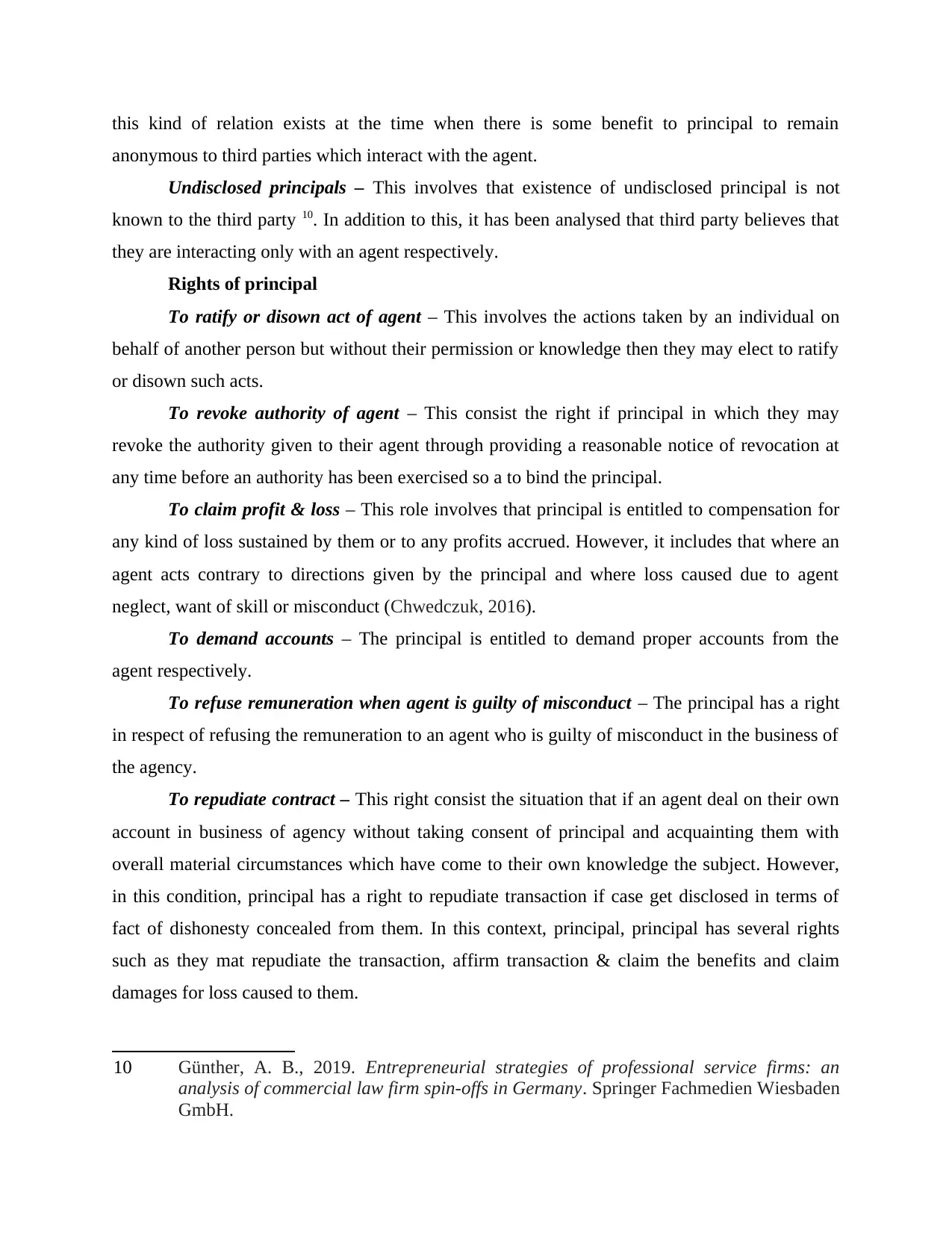
this kind of relation exists at the time when there is some benefit to principal to remain
anonymous to third parties which interact with the agent.
Undisclosed principals – This involves that existence of undisclosed principal is not
known to the third party 10. In addition to this, it has been analysed that third party believes that
they are interacting only with an agent respectively.
Rights of principal
To ratify or disown act of agent – This involves the actions taken by an individual on
behalf of another person but without their permission or knowledge then they may elect to ratify
or disown such acts.
To revoke authority of agent – This consist the right if principal in which they may
revoke the authority given to their agent through providing a reasonable notice of revocation at
any time before an authority has been exercised so a to bind the principal.
To claim profit & loss – This role involves that principal is entitled to compensation for
any kind of loss sustained by them or to any profits accrued. However, it includes that where an
agent acts contrary to directions given by the principal and where loss caused due to agent
neglect, want of skill or misconduct (Chwedczuk, 2016).
To demand accounts – The principal is entitled to demand proper accounts from the
agent respectively.
To refuse remuneration when agent is guilty of misconduct – The principal has a right
in respect of refusing the remuneration to an agent who is guilty of misconduct in the business of
the agency.
To repudiate contract – This right consist the situation that if an agent deal on their own
account in business of agency without taking consent of principal and acquainting them with
overall material circumstances which have come to their own knowledge the subject. However,
in this condition, principal has a right to repudiate transaction if case get disclosed in terms of
fact of dishonesty concealed from them. In this context, principal, principal has several rights
such as they mat repudiate the transaction, affirm transaction & claim the benefits and claim
damages for loss caused to them.
10 Günther, A. B., 2019. Entrepreneurial strategies of professional service firms: an
analysis of commercial law firm spin-offs in Germany. Springer Fachmedien Wiesbaden
GmbH.
anonymous to third parties which interact with the agent.
Undisclosed principals – This involves that existence of undisclosed principal is not
known to the third party 10. In addition to this, it has been analysed that third party believes that
they are interacting only with an agent respectively.
Rights of principal
To ratify or disown act of agent – This involves the actions taken by an individual on
behalf of another person but without their permission or knowledge then they may elect to ratify
or disown such acts.
To revoke authority of agent – This consist the right if principal in which they may
revoke the authority given to their agent through providing a reasonable notice of revocation at
any time before an authority has been exercised so a to bind the principal.
To claim profit & loss – This role involves that principal is entitled to compensation for
any kind of loss sustained by them or to any profits accrued. However, it includes that where an
agent acts contrary to directions given by the principal and where loss caused due to agent
neglect, want of skill or misconduct (Chwedczuk, 2016).
To demand accounts – The principal is entitled to demand proper accounts from the
agent respectively.
To refuse remuneration when agent is guilty of misconduct – The principal has a right
in respect of refusing the remuneration to an agent who is guilty of misconduct in the business of
the agency.
To repudiate contract – This right consist the situation that if an agent deal on their own
account in business of agency without taking consent of principal and acquainting them with
overall material circumstances which have come to their own knowledge the subject. However,
in this condition, principal has a right to repudiate transaction if case get disclosed in terms of
fact of dishonesty concealed from them. In this context, principal, principal has several rights
such as they mat repudiate the transaction, affirm transaction & claim the benefits and claim
damages for loss caused to them.
10 Günther, A. B., 2019. Entrepreneurial strategies of professional service firms: an
analysis of commercial law firm spin-offs in Germany. Springer Fachmedien Wiesbaden
GmbH.
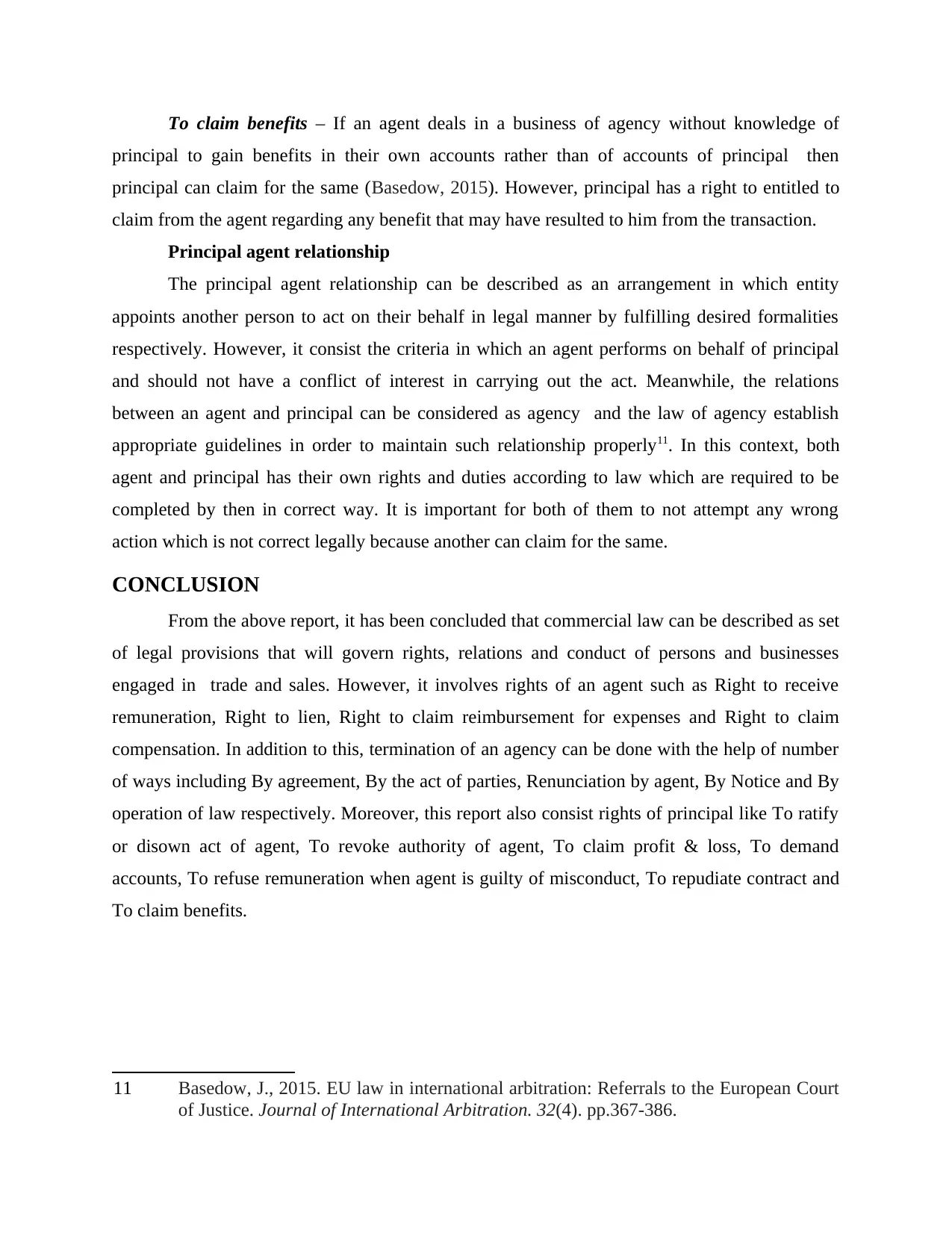
To claim benefits – If an agent deals in a business of agency without knowledge of
principal to gain benefits in their own accounts rather than of accounts of principal then
principal can claim for the same (Basedow, 2015). However, principal has a right to entitled to
claim from the agent regarding any benefit that may have resulted to him from the transaction.
Principal agent relationship
The principal agent relationship can be described as an arrangement in which entity
appoints another person to act on their behalf in legal manner by fulfilling desired formalities
respectively. However, it consist the criteria in which an agent performs on behalf of principal
and should not have a conflict of interest in carrying out the act. Meanwhile, the relations
between an agent and principal can be considered as agency and the law of agency establish
appropriate guidelines in order to maintain such relationship properly11. In this context, both
agent and principal has their own rights and duties according to law which are required to be
completed by then in correct way. It is important for both of them to not attempt any wrong
action which is not correct legally because another can claim for the same.
CONCLUSION
From the above report, it has been concluded that commercial law can be described as set
of legal provisions that will govern rights, relations and conduct of persons and businesses
engaged in trade and sales. However, it involves rights of an agent such as Right to receive
remuneration, Right to lien, Right to claim reimbursement for expenses and Right to claim
compensation. In addition to this, termination of an agency can be done with the help of number
of ways including By agreement, By the act of parties, Renunciation by agent, By Notice and By
operation of law respectively. Moreover, this report also consist rights of principal like To ratify
or disown act of agent, To revoke authority of agent, To claim profit & loss, To demand
accounts, To refuse remuneration when agent is guilty of misconduct, To repudiate contract and
To claim benefits.
11 Basedow, J., 2015. EU law in international arbitration: Referrals to the European Court
of Justice. Journal of International Arbitration. 32(4). pp.367-386.
principal to gain benefits in their own accounts rather than of accounts of principal then
principal can claim for the same (Basedow, 2015). However, principal has a right to entitled to
claim from the agent regarding any benefit that may have resulted to him from the transaction.
Principal agent relationship
The principal agent relationship can be described as an arrangement in which entity
appoints another person to act on their behalf in legal manner by fulfilling desired formalities
respectively. However, it consist the criteria in which an agent performs on behalf of principal
and should not have a conflict of interest in carrying out the act. Meanwhile, the relations
between an agent and principal can be considered as agency and the law of agency establish
appropriate guidelines in order to maintain such relationship properly11. In this context, both
agent and principal has their own rights and duties according to law which are required to be
completed by then in correct way. It is important for both of them to not attempt any wrong
action which is not correct legally because another can claim for the same.
CONCLUSION
From the above report, it has been concluded that commercial law can be described as set
of legal provisions that will govern rights, relations and conduct of persons and businesses
engaged in trade and sales. However, it involves rights of an agent such as Right to receive
remuneration, Right to lien, Right to claim reimbursement for expenses and Right to claim
compensation. In addition to this, termination of an agency can be done with the help of number
of ways including By agreement, By the act of parties, Renunciation by agent, By Notice and By
operation of law respectively. Moreover, this report also consist rights of principal like To ratify
or disown act of agent, To revoke authority of agent, To claim profit & loss, To demand
accounts, To refuse remuneration when agent is guilty of misconduct, To repudiate contract and
To claim benefits.
11 Basedow, J., 2015. EU law in international arbitration: Referrals to the European Court
of Justice. Journal of International Arbitration. 32(4). pp.367-386.
⊘ This is a preview!⊘
Do you want full access?
Subscribe today to unlock all pages.

Trusted by 1+ million students worldwide
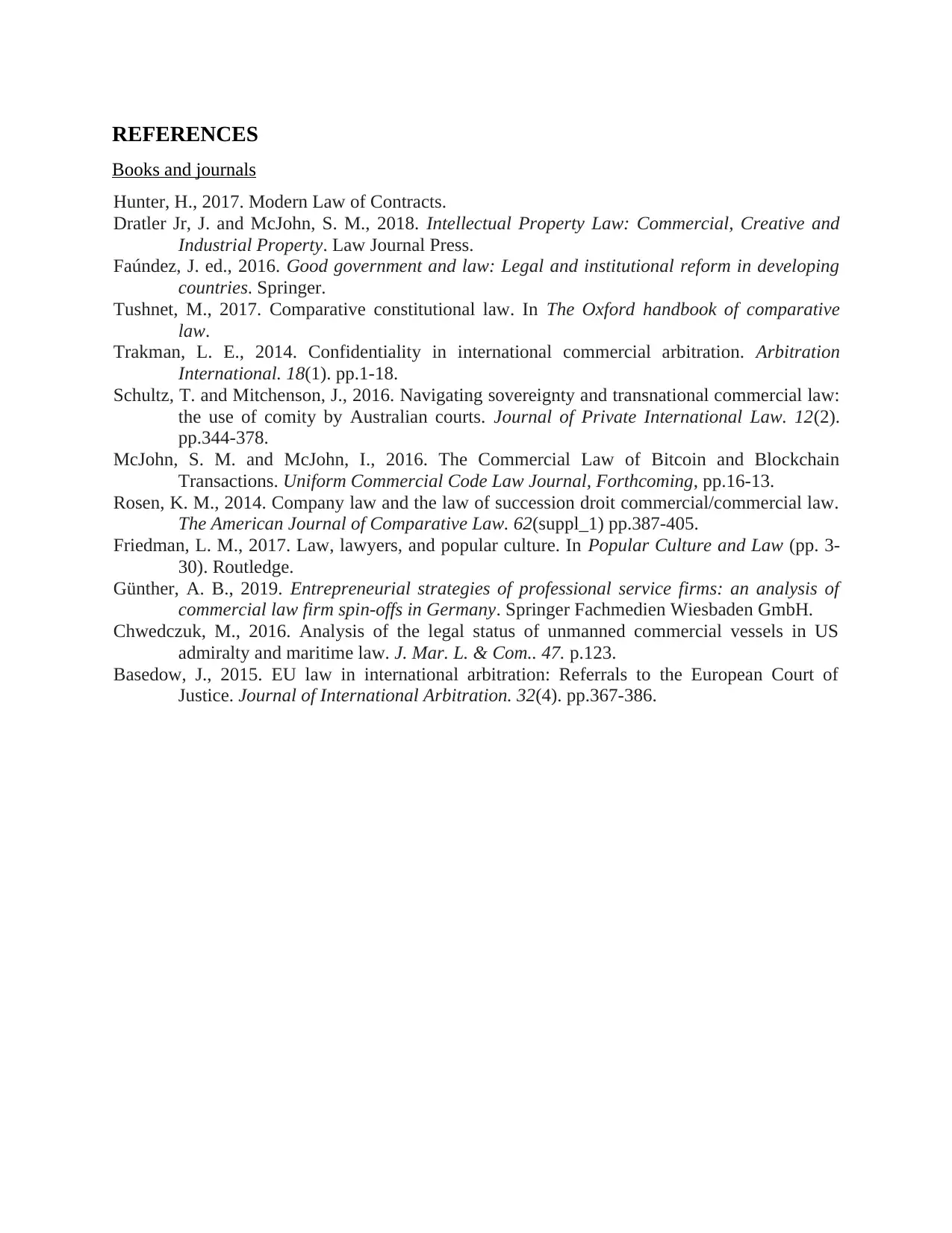
REFERENCES
Books and journals
Hunter, H., 2017. Modern Law of Contracts.
Dratler Jr, J. and McJohn, S. M., 2018. Intellectual Property Law: Commercial, Creative and
Industrial Property. Law Journal Press.
Faúndez, J. ed., 2016. Good government and law: Legal and institutional reform in developing
countries. Springer.
Tushnet, M., 2017. Comparative constitutional law. In The Oxford handbook of comparative
law.
Trakman, L. E., 2014. Confidentiality in international commercial arbitration. Arbitration
International. 18(1). pp.1-18.
Schultz, T. and Mitchenson, J., 2016. Navigating sovereignty and transnational commercial law:
the use of comity by Australian courts. Journal of Private International Law. 12(2).
pp.344-378.
McJohn, S. M. and McJohn, I., 2016. The Commercial Law of Bitcoin and Blockchain
Transactions. Uniform Commercial Code Law Journal, Forthcoming, pp.16-13.
Rosen, K. M., 2014. Company law and the law of succession droit commercial/commercial law.
The American Journal of Comparative Law. 62(suppl_1) pp.387-405.
Friedman, L. M., 2017. Law, lawyers, and popular culture. In Popular Culture and Law (pp. 3-
30). Routledge.
Günther, A. B., 2019. Entrepreneurial strategies of professional service firms: an analysis of
commercial law firm spin-offs in Germany. Springer Fachmedien Wiesbaden GmbH.
Chwedczuk, M., 2016. Analysis of the legal status of unmanned commercial vessels in US
admiralty and maritime law. J. Mar. L. & Com.. 47. p.123.
Basedow, J., 2015. EU law in international arbitration: Referrals to the European Court of
Justice. Journal of International Arbitration. 32(4). pp.367-386.
Books and journals
Hunter, H., 2017. Modern Law of Contracts.
Dratler Jr, J. and McJohn, S. M., 2018. Intellectual Property Law: Commercial, Creative and
Industrial Property. Law Journal Press.
Faúndez, J. ed., 2016. Good government and law: Legal and institutional reform in developing
countries. Springer.
Tushnet, M., 2017. Comparative constitutional law. In The Oxford handbook of comparative
law.
Trakman, L. E., 2014. Confidentiality in international commercial arbitration. Arbitration
International. 18(1). pp.1-18.
Schultz, T. and Mitchenson, J., 2016. Navigating sovereignty and transnational commercial law:
the use of comity by Australian courts. Journal of Private International Law. 12(2).
pp.344-378.
McJohn, S. M. and McJohn, I., 2016. The Commercial Law of Bitcoin and Blockchain
Transactions. Uniform Commercial Code Law Journal, Forthcoming, pp.16-13.
Rosen, K. M., 2014. Company law and the law of succession droit commercial/commercial law.
The American Journal of Comparative Law. 62(suppl_1) pp.387-405.
Friedman, L. M., 2017. Law, lawyers, and popular culture. In Popular Culture and Law (pp. 3-
30). Routledge.
Günther, A. B., 2019. Entrepreneurial strategies of professional service firms: an analysis of
commercial law firm spin-offs in Germany. Springer Fachmedien Wiesbaden GmbH.
Chwedczuk, M., 2016. Analysis of the legal status of unmanned commercial vessels in US
admiralty and maritime law. J. Mar. L. & Com.. 47. p.123.
Basedow, J., 2015. EU law in international arbitration: Referrals to the European Court of
Justice. Journal of International Arbitration. 32(4). pp.367-386.
1 out of 10
Related Documents
Your All-in-One AI-Powered Toolkit for Academic Success.
+13062052269
info@desklib.com
Available 24*7 on WhatsApp / Email
![[object Object]](/_next/static/media/star-bottom.7253800d.svg)
Unlock your academic potential
Copyright © 2020–2025 A2Z Services. All Rights Reserved. Developed and managed by ZUCOL.





